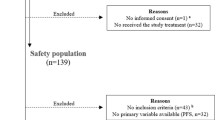Abstract
Although the incidence of breast cancer has been declining in recent years, the disease is still one of the leading causes of cancer deaths in women. Recently, breast cancer has been treated with innovative approaches that use hormone-sensitive therapies. This is because in at least one-third of breast cancers, estrogens mediated via the estrogen receptor pathway act as endocrine growth factors. Fulvestrant has been studied as both first- and second-line therapy for locally advanced and metastatic breast cancer, but few studies have shown its effect as third-line therapy alone. To observe the disease time to progression (TTP) obtained with fulvestrant when used on metastatic breast cancer as first-, second-, and also third-line therapy. We also aimed to correlate the TTP obtained with fulvestrant with hormone receptor, HER2 expression, and metastatic site. This was a cohort study that retrospectively examined medical records of 73 postmenopausal women with advanced breast cancer who were treated with fulvestrant (250 mg/month i.m. injection) and followed at the Department of Medical Oncology at Hospital do Cancer A. C. Camargo in São Paulo, Brazil from August 2003 to December 2006. The median TTP with fulvestrant was about 11 months. When used as the first-line therapy, TTP was about 13 months; when used as second-line, TTP was about 6 months; and when used as third-line, it was about 12 months. No statistically significant difference was observed regarding the therapy line. In patients with positive ER tumors, TTP was 11 months. No significant difference in TTP was observed in negative ER tumors (TTP = 10 months). In patients with positive PgR tumors, TTP was 13 months and for negative PgR, TTP was 6 months (P = 0.008). According to the HER2 status, the TTP was 5 months for HER2+ and 10 months for HER2−. Our findings indicate that fulvestrant is an effective alternative for treatment of metastatic breast cancer.

Similar content being viewed by others
References
Muss HB. Endocrine therapy for advanced breast cancer: a review. Breast Cancer Res Treat. 1992;21:15–26.
Rose C, Thorpe SM, Andersen KW, Pedersen BV, Mouridsen HT, et al. Beneficial effect of adjuvant tamoxifen therapy in primary breast cancer patients with high oestrogen receptor values. Lancet. 1985;1:16–9.
Robertson JF, Nicholson RI, Bundred NJ, et al. Comparison of the short-term biological effects of ICI 182, 780 (Faslodex TM) versus Tamoxifen in postmenopausal women with primary breast cancer. Cancer Res. 2001;61:6739–46.
Wakeling AE, Dukes M, Bowler J. A potent specific pure anti-estrogen with clinical potential. Cancer Res. 1991;51:3867–73.
DeFriend DJ, Howell A, Nicholson RI, Anderson E, Dowsett M, et al. Investigation of a new pure antiestrogen (ICI 182780) in women with primary breast cancer. Cancer Res. 1994;54:408–14.
Howell A, Robertson JFR, Abram P, et al. Comparison of fulvestrant versus tamoxifen for the treatment of advanced breast cancer in postmenopausal women previously untreated with endocrine therapy: a multinational, double-blind, randomized trial. J Clin Oncol. 2004;22:1605–13.
Steger GG, Bartsch R, Wenzel C, Pluschinig U, Hussian D, et al. Fulvestrant (`Faslodex`) in pre-treated patients with advanced breast cancer: a single-centre experience. Eur J Cancer. 2005;41:2655–61.
Chia S, Gradishar W, Mauriac L, Bines J, Amant F, et al. Double-blind, randomized placebo controlled trial of fulvestrant compared with exemestane after prior nonsteroidal aromatase inhibitor therapy in postmenopausal women with hormone receptor-positive, advanced breast cancer: results from EFECT. J Clin Oncol. 2008;26:1664–70.
Bartsch R, Mlineritsch B, Gnat M, Niernberger T, Pluschnig U, et al. The Austrian fulvestrant registry: results from a prospective observation of fulvestrant in postmenopausal patients with metastatic breast cancer. Breast Cancer Res Treat. 2009;115:373–80.
Martinez Marin V, Munoz Martin AJ, Vinuela Beneitez MC, Garcia Alfonso P, Alonso Munoz A, Perez Manga G. Fulvestrant in heavily pretreated postmenopausal women with advanced breast cancer. Med Clin. 2009;133:371–4.
Bartsch R, Wenzel C, Altorjai G, Pluschnig U, Mader RM, et al. Her 2 and progesterone receptor status are not predictive of response to fulvestrant treatment. Clin Cancer Res. 2007;13:4435–9.
Rasmussen BB, Regan MM, Lykkesfeldt AE, et al. Central assessment of ER, PgR and HER2 in BIG 1-98 evaluating letrozole (L) compared to tamoxifen (T) as initial adjuvant endocrine therapy for postmenopausal women with hormone receptor-positive breast cancer. J Clin Oncol. 2007;25(18S):538. ASCO Annual Meeting Proceedings Part I.
Robertson JF, LLombart-Cussac A, Rolski J, Feltl D, Dewar J, et al. Activity of fulvestrant 500 mg versus anastrozole 1 mg as first-line treatment for advanced breast cancer: results from the FIRST study. J Clin Oncol. 2009;27:4530–5.
Ingle JN, Suman VJ, Rowland KM, Mirchandani D, et al. Fulvestrant in women with advanced breast cancer after progression on prior aromatase inhibitor therapy: North Central Cancer Treatment Group Trial N0032. J Clin Oncol. 2006;24:1052–6.
Mlineritsch B, Psenak O, Mayer P, Moik M, et al. Fulvestrant (`Faslodex`) in a heavily pretreated postmenopausal patients with advanced breast cancer: single centre clinical experience from the compassionate use programme. Breast Cancer Res Treat. 2007;106:105–12.
Author information
Authors and Affiliations
Corresponding author
Rights and permissions
About this article
Cite this article
Mello, C.A.L., Chinen, L.T.D., da Silva, S.C.S. et al. Prolonged time to progression with fulvestrant for metastatic breast cancer. Med Oncol 28, 416–419 (2011). https://doi.org/10.1007/s12032-010-9469-4
Received:
Accepted:
Published:
Issue Date:
DOI: https://doi.org/10.1007/s12032-010-9469-4




